Software: Visual Studio 2017 Community
Hi, everybody,
I am making a simple 2d console game in C++ (perhaps very simplified Dwarf Fortress if you know it).
And I want a map to be displayed in console with ASCII.
Something like this:
I have a WorldMap class declared in the header file(simplified version). And I declare a 2d array inside it.
#pragma once
#include <iostream>
class WorldMap
{
public:
WorldMap();
virtual ~WorldMap();
private:
int worldWidth;
int worldHeight;
char worldMap; // Declare a variable that will hold all the characters for the map
};
And then define it in the .cpp file:
#include "WorldMap.h"
#include <algorithm>
WorldMap::WorldMap()
{
worldWidth = 50;
worldHeight = 50;
worldMap[50][50]; // Define the map array
// And then here I will also somehow need to be able to fill the whole map with '.' symbols, and so on
}
So that is the basic idea of what I am trying to achieve. The reason why I can't define the array size immediately is because I want to be able to choose the size of the map when the map is created.
I have already tried:
- The code above.
Error:
error C2109: subscript requires array or pointer type
- Declaring 2d array as
char worldMap[][];and then defining it asworldMap[50][50];.
Error:
error C2087: 'worldMap': missing subscript
warning C4200: nonstandard extension used: zero-sized array in struct/union
message : This member will be ignored by a defaulted constructor or copy/move assignment operator
- Declaring 2d array as
char worldMap[worldWidth][worldHeight];, expecting that when the object is created, the width and height variables will be defined first, and then they will define the array.
Error:
error C2327: 'WorldMap::worldWidth': is not a type name, static, or enumerator
error C2065: 'worldWidth': undeclared identifier
error C2327: 'WorldMap::worldHeight': is not a type name, static, or enumerator
error C2065: 'worldHeight': undeclared identifier
- Using
char* worldMap;andchar** worldMap, but so far I can't even understand how double pointer works, yetchar* worldMapactually works with a 1D array without errors, until I start accessing values of the elements in the array.
I suppose a workaround would be to use a string or 1D char array and when displaying it just use mapWidth to end line each 50 characters for example, which will give the same result. But I feel like that's not a good way to achieve this since I will need to access x and y coords of this map and so on.
I guess what I am asking is:
- What's the best way of declaring a 2d array for a class and then defining it in the object?
- What's the best way to store a map for such a console game? (Not necessarily using arrays)
Thank you for reading. I will really appreciate any help, even just ideas and tips might push me in the right direction :)
